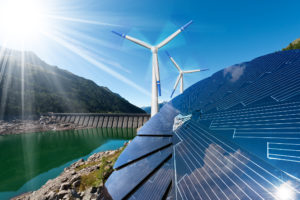Reflections on the Energy Crisis: A Statement by the Committee on Social Development and World Peace
United States Conference of Catholic Bishops, April 2, 1981
 The Moral Dimensions of Energy Policy
The Moral Dimensions of Energy Policy
Catholic social teaching suggests certain clear principles that should be borne in mind as Americans, remembering their brothers and sisters in other nations, strive to adjust to a world where oil and natural gas are no longer readily available.
Moral Principles
Upholding the right to life
It is clear that no overall energy strategy is free from risk to human life…The church recognizes these sad facts. It is deeply committed to the defense of human life, however, and this commitment is uppermost in its approach to energy. Energy planners and those in authority must do all in their power to safeguard human life.
Accepting an appropriate share of responsibility for the welfare of creation
Judeo-Christian tradition views human beings not in isolation but as part of a larger whole – as creatures in the midst of creation. This tradition counsels respect for the natural world, emphasizing that we have duties as well as rights in its use. Since we derive all our energy from nature, the relationship of humanity and the environment has the broadest implications for energy policy.
Accepting limitation in a Christian spirit
If preservation of the common good, both domestic and global, requires that we as individuals make sacrifices related to energy use, we should do so cheerfully. Future resource restrictions may force us to rethink our expectations; they may even lead to substantial changes in our way of life. This means rising above a preoccupation with material gain.
Striving for a more just society
The energy policies we choose must reflect a search after justice for all, not only on the level of individual rights but also with regard to the structures of society. Catholic social teaching has touched on these themes time and again. Gaudium et Spes declares, “[I]t devolves on humanity to establish a political, social and economic order which will increasingly serve people and help individuals as well as groups to affirm and develop the dignity proper to them” no.9. The desire for economic justice must dominate.
Giving special attention to the needs of the poor and members of minority groups
As noted above, poor people, especially those with fixed incomes, will feel the sting of rising energy prices more keenly than their affluent neighbors. Private agencies and federal, state and local authorities must take whatever steps are necessary to ensure an adequate supply to people whom poverty or discrimination place at a disadvantage. No energy policy is acceptable that fails to deal adequately with basic needs.
Domestic policy, far from imposing burdens on the economies of other nations, should be consistent with the goal of promoting sound development throughout the world.
Participating in the decision-making process
Fairness requires that groups and individuals representing a broad spectrum of opinion have an opportunity to take part in formulating energy policy. Even local energy decisions often involve danger to life and health, and national ones can have major economic effects and can help determine the patterns of power in society. Given the inequalities that pervade American society, fairness may also require active assistance to those whose voice is rarely heard in policy discussions.
